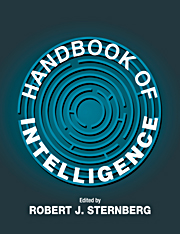Book contents
- Frontmatter
- Contents
- Preface
- Contributors
- PART I THE NATURE OF INTELLIGENCE AND ITS MEASUREMENT
- PART II DEVELOPMENT OF INTELLIGENCE
- PART III GROUP ANALYSES OF INTELLIGENCE
- PART IV BIOLOGY OF INTELLIGENCE
- PART V INTELLIGENCE AND INFORMATION PROCESSING
- 13 Simple information Processing and Intelligence
- 14 Complex Information Processing and Intelligence
- 15 Artificial Intelligence
- PART VI KINDS OF INTELLIGENCE
- PART VII TESTING AND TEACHING INTELLIGENCE
- PART VIII INTELLIGENCE, SOCIETY, AND CULTURE
- PART IX INTELLIGENCE IN RELATION TO ALLIED CONSTRUCTS
- Author Index
- Subject Index
13 - Simple information Processing and Intelligence
Published online by Cambridge University Press: 05 June 2012
- Frontmatter
- Contents
- Preface
- Contributors
- PART I THE NATURE OF INTELLIGENCE AND ITS MEASUREMENT
- PART II DEVELOPMENT OF INTELLIGENCE
- PART III GROUP ANALYSES OF INTELLIGENCE
- PART IV BIOLOGY OF INTELLIGENCE
- PART V INTELLIGENCE AND INFORMATION PROCESSING
- 13 Simple information Processing and Intelligence
- 14 Complex Information Processing and Intelligence
- 15 Artificial Intelligence
- PART VI KINDS OF INTELLIGENCE
- PART VII TESTING AND TEACHING INTELLIGENCE
- PART VIII INTELLIGENCE, SOCIETY, AND CULTURE
- PART IX INTELLIGENCE IN RELATION TO ALLIED CONSTRUCTS
- Author Index
- Subject Index
Summary
INTRODUCTION
To have accepted the invitation to write a chapter with this title is to accept a poisoned chalice. The poison is in the word “simple.” “Apparently simple” will be the otherwise unspoken assumption of the rest of this chapter. What will be presented as simple are those tasks the researchers thought were directly or indirectly assessing a single, basic limitation in the processing of information. Therefore, consigned to “complexity” are those experimental psychology tasks from which information processing parameters may be distilled. These include reaction time procedures such as the Hick and Posner tasks, and S. Sternberg's rapid memory scanning task. A review of these tasks and their relevance to “mental speed” concepts of intelligence is available elsewhere (Neubauer, 1997, which also includes R. Sternberg's reaction–time-based studies of the components of analogical and other types of reasoning). For a brief evaluation of this research, see Deary (1997). Thus, the data presented here will not cover most tasks borrowed from experimental-cognitive psychology; a lower level is addressed. Now that what is too complex for inclusion has been indicated, what is considered too simple? Not covered here are those correlates of intelligence that are arguably more biological, such as nerve conduction velocity, brain-evoked potentials, brain anatomy, and functional brain scanning. The association between these indicators of brain integrity and psychometric intelligence is reviewed by Deary & Caryl (1997a) and Vernon (1993).
- Type
- Chapter
- Information
- Handbook of Intelligence , pp. 267 - 284Publisher: Cambridge University PressPrint publication year: 2000
- 37
- Cited by



